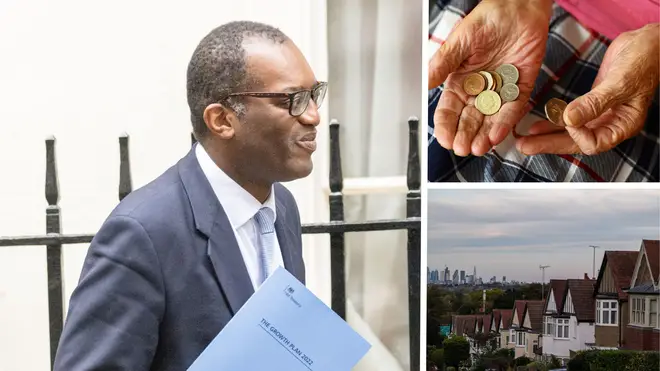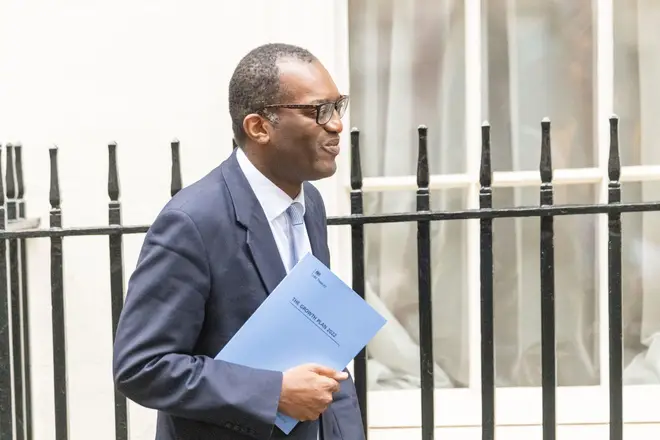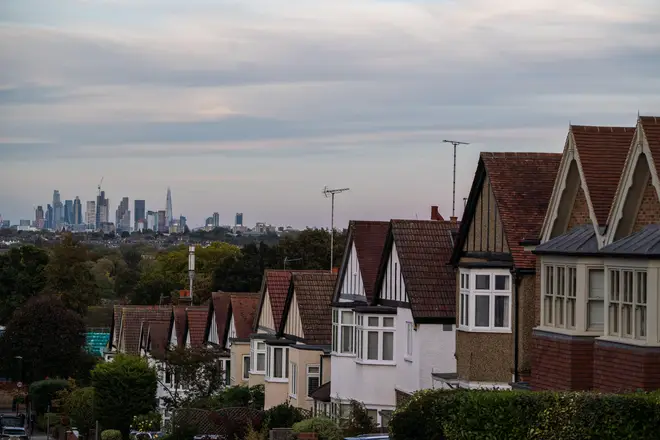
Richard Spurr 1am - 4am
12 October 2022, 11:57

The UK economy has had a tumultuous few weeks.
In a bid to tackle the impact of soaring inflation and surging energy prices, Chancellor Kwasi Kwarteng announced a mini Budget on September 23.
But the plans caused the pound to plummet, with knock-on effects on mortgages, pensions and even your household shop.
Here's what the economic turmoil means for you.
In order to understand how and why the economy is struggling, it's important to briefly summarise what's happened.
In September, Mr Kwarteng announced huge tax cuts without saying how the government would pay for them.
As a result, the value of the pound fell because investors had less confidence in the UK's economy.
Government bonds or gilts - essentially an 'IOU' from the government, so investors can lend them money and get it paid back, with interest, at a later date - suddenly became much less appealing for investors.
As a result, the government faced the threat of having a drop in income from this technique.
Also, the interest the government would pay when investors buy government bonds increased.
The Bank of England stepped in and bought the bonds when investors did not want to - but this support is coming to an end on Friday.
All of this has knock-on effects for Brits.

Drops in the value of the pound have impacts on ordinary people.
When the value of the pound falls, it costs more in UK currency to import goods from overseas - costs that must then be passed onto consumers.
Goods and services that the UK imports that could go up as a result of the falling pound include petrol, food and technology.
Another impact of the value of the pound is exchanging currency. If you're going away and need to exchange money, you'll find you're handing over more pounds in exchange for the same amount of foreign currency.
Watch: James O'Brien lambasts Liz Truss and Kwasi Kwarteng as he slams 'prioritisation of profit' in UK
One of the biggest worries about the current financial situation is the impact on people's pensions.
Like all investments, the value of pensions rises and falls depending on the economic situation.
But the value of them is particularly under threat now because pension funds often buy bonds, as they are seen as safe investments.
They also buy a certain kind of insurance in order to protect the value of the bonds - but the cost of this insurance went up as government borrowing costs increased and the bonds were no longer perceived as safe.
As a result pension funds had to sell bonds in order to pay the insurance costs.
And selling the bonds causes the value of them to fall further, creating a downward spiral.

Business Sec: Pension funds almost went bust due to risky investments
The impact is that people are seeing significant drops in the value of their pension savings.
Calculations by former pensions minister Steve Webb suggested that over 300,000 people may have lost at least £10,000 from their pension funds, according to the i newspaper.
This depends on what type of pension you have, and when you'll take it out.
For example, many private or workplace pensions are covered by the Financial Services Compensation Scheme (FSCS), guaranteeing 100 per cent of your pension if a fund goes bust.
But other pensions, such as self-invested personal pensions, may not guarantee the same level of protection.
Read more: UK economy shrank unexpectedly by 0.3 per cent in August, official figures show
But Helen Morrissey, senior pensions and retirement analyst at Hargreaves Lansdown, said it was important to remember that pensions are a long-term investment.
By the time you actually need to use your pension, its value may well have returned or even be higher than it is now.
"Pensions are a long-term investment and over the course of a working life savers will experience several periods of volatility," she said.
People are advised to seek professional advice if they are worried about their pension, especially if they are considering withdrawing it.

The Bank of England to protect pensions
Mortgage costs have been surging since the mini Budget.
The cost of government bonds are used to price loans. If bond prices go up, interest rates on mortgages go down, and vice versa.
As a result, a significant fall in the value of government bonds lead to skyrocketing interest rates - which is what's happened.
Andrew Wishart, senior economist at Capital Economics, said: "The increase in interest rates that markets have been expecting over the past few days is going to pass through very quickly to mortgage rates as we've seen with lenders withdrawing their products.
"Mortgage rates rising to about 6 per cent is pretty unavoidable now and that would take the cost of a mortgage on a new home purchase to its highest as a share of income since 2007."

If you're on a fixed rate, and are near the start, then there's nothing to worry about for now.
Those most vulnerable are those who are coming off a fixed rate and will need to remortgage soon.
Read more: Kwarteng's plans will boost UK growth before sharp fall in 2023, IMF says
Many homeowners will be worried about the future because it is not known whether mortgage rates will get better or worse.
And even if they do get higher, that doesn't mean it's necessarily smart to leave your fixed rate early and remortgage now because there will likely be early repayment charges.
The mortgage broker Private Finance is encouraging those on a fixed rate with a term of 18 months or less "to get in touch and consider their remortgage options now".